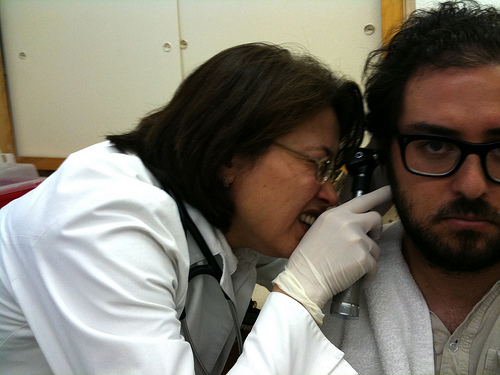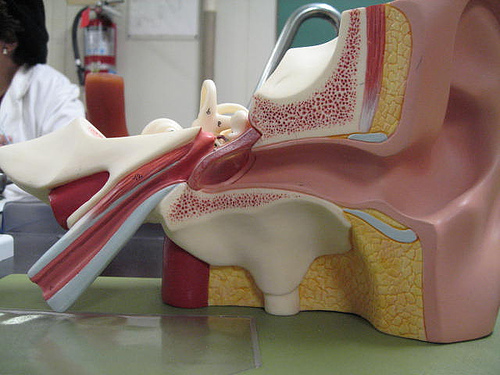Tinnitus is a symptom, not a specific disease. Regardless of whether it is called a disease or a symptom, patients still want the strange ringing or humming in their ears to stop. Therefore physicians have developed a clinical pathway to identify the cause of tinnitus so that treatment for the underlying disease can be administered (while satisfying the patients desire to get rid of the ringing ears).

History
As with any clinical issue, a detailed history is the first step. Your physician will ask you when the tinnitus started, is it in one or both ears, does it occur at one time of the day more than others, what the tinnitus sounds like, and if you notice if anything makes the sound better or worse. Your doctor will also ask about related symptoms. Are you also experiencing vertigo, dizziness, nausea, vomiting, fullness in the ears, hearing loss, or a particular sensitivity to sound? Each of these things may help guide the diagnosis. Family and work histories are also important as well as information about the drugs you are taking whether they are prescription, over-the-counter, herbal or illicit. Finally and importantly, the workup and treatment depend on how important the symptom of tinnitus is to you. If the tinnitus is a mild nuisance, less aggressive therapy will be pursued. If the tinnitus is unbearable or high distressing, the doctor will pursue diagnosis and treatment a bit harder.

Click Here for #1 Rated Tinnitus Treatment
Physical examination
While the physical exam should cover the whole body, obviously the ear and head will be the primary focus. The physician will look for easily treatable causes of tinnitus, such as earwax or infection. The doctor will also inspect the eardrum to see if it punctured or damaged. She will also inspect the skull around the ear, the throat, and nostrils looking for obvious abnormalities. The workup also includes a neurological exam in which the cranial nerves are tested. The cranial nerves are the nerves that communicate information from the head to the brain. The eighth cranial nerve is particularly important in this case because it provides electrical signals related to hearing and balance.
There are two in-office tests of hearing that are performed with a tuning fork, namely the Rinne and the Weber tests. Both tests help the physician determine if there is hearing loss and distinguish between conductive and sensorineural causes. Conductive hearing loss means sound waves are not reaching the cochlea because of some physical problem. Sensorineural hearing loss involves the specialized organs of hearing. As you might expect, conductive hearing loss is easier to treat than sensorineural. Unfortunately, the latter type is often associated with tinnitus.

Blood tests and radiological studies
The tinnitus workup includes a number of blood tests, especially if the history and physical exam lead the doctor to suspect that there is a hormonal or metabolic cause. She will send for tests of thyroid hormone, complete blood chemistry (CBC), and tests to measure blood cholesterol. Tests for vitamin deficiencies are less often ordered, but vitamin B12 levels may be assessed. If the cause is likely to be physical, like an abnormal blood vessel, the doctor may order a special CT or MRI study. These tests are “special” because they specifically focus on the blood vessels (CTA and MRA). The studies are done in such a way to make the blood vessels in and around the ear “light up” so that they can be carefully studied. These tests are not only diagnostic, but if a physical cause is identified they will be instrumental in planning surgery to treat the tinnitus.
Audiometric testing
At some point in the tinnitus workup, a referral is usually made to an audiologist for audiometric testing. This is done to better characterize the tinnitus, judge severity, and create a common language for the patient and the clinician. For example, the audiometric testing identifies the quality of the tinnitus sound. What is ringing? What is clicking? Formal and complete audiometric testing is called an audiogram—a map of your hearing system. The process may include provocative tests (tests to make the tinnitus temporarily worse) or palliative tests (tests to make the tinnitus temporarily better). This can be helpful for identifying a treatment. The audiogram and related tests are sent to your physician to direct further care.
Click Here For Highest Rated Tinnitus Treatment
1. Tinnitus Miracle - www.TinnitusMiracle.com
2. Tinnitus Control - www.TinnitusControl.com
3. Tinnitus Cure - www.TinnitusCure.com
 Our surprise pick is an all natural solution that you can use to get relief from Tinnitus.
Our surprise pick is an all natural solution that you can use to get relief from Tinnitus.